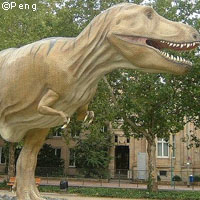Mammal diversification not due to dinosaurs' demise
Contrary to popular belief, the extinction of the dinosaurs 65 million years ago had little impact on the evolution and diversification of modern mammals, an international team of researchers reports in the journal Nature. The dinosaurs died out when a massive asteroid slammed into Mexico's Yucatan Peninsula. Until now it was widely believed that modern mammals diversified rapidly following this mass extinction event, as they evolved to fill the ecological niches vacated by the dinosaurs. However, the new research suggests that in fact the ancestors of lineages which would go on to evolve into most of today's mammals already existed 85 million years ago, and while they survived the catastrophe which killed off the dinosaurs, they did not start to diversify for another 10 to 15 million years. The scientists arrived at their conclusion after constructing the world's first 'supertree' showing the evolutionary relationships between 4,500 species of mammal. The tree, which goes back 160 million years, covers 99% of mammals alive today. It was worked out on the basis of the fossil record and molecular analyses of the genetic differences between species. Because changes to genes take place at a relatively constant rate, counting the differences between two species can tell researchers how long ago their lineages split. The work took over a decade to complete and brought together palaeontologists, bioinformaticians, evolutionary biologists and ecologists. The researchers identified an early burst of mammalian diversification 93 million years ago, when the major groups appeared. 'Extensive molecular data indicate that our common mammalian roots have to go back 90 to 100 million years, if not more, but many palaeontologists have been dubious of this claim given the lack of ancestral looking fossils until about 50 to 55 million years ago,' commented Dr Ross MacPhee of the American Museum of Natural History. 'Now we know the ancestors of living mammal groups were there, but in very low numbers.' The tree shows that just a few mammal groups diversified rapidly in the aftermath of the dinosaurs' extinction, and most of these lineages have since become extinct. In fact the main peak of mammalian diversification started some 10 to 15 million years after the dinosaurs died out. Why the mammals did not diversify sooner, and what triggered this burst of evolution when it finally happened, remain unknown, although the researchers point out that this increase in biodiversity coincides with a rise in global temperatures. 'The end result is that the mammals we know today are actually quite old and just flew under the radar of everything that was out there, be they dinosaurs or now other 'archaic' mammals as well, for a lot longer than most people suspected,' said lead researcher Olaf Bininda-Emonds of the University of Jena, Germany. 'This is just the first of many insights, if not surprises, about mammalian evolution to be mined with the help of the tree.' 'Not only does this research show that the extinction of the dinosaurs did not cause the evolution of modern-day mammals, it also provides us with a wealth of other information,' added Dr Kate Jones of the Zoological Society of London. 'Vitally, scientists will be able to use the research to look into the future and identify species that will be at risk of extinction. The benefit to global conservation will be incalculable.'
Countries
Australia, Canada, Germany, United Kingdom, United States



